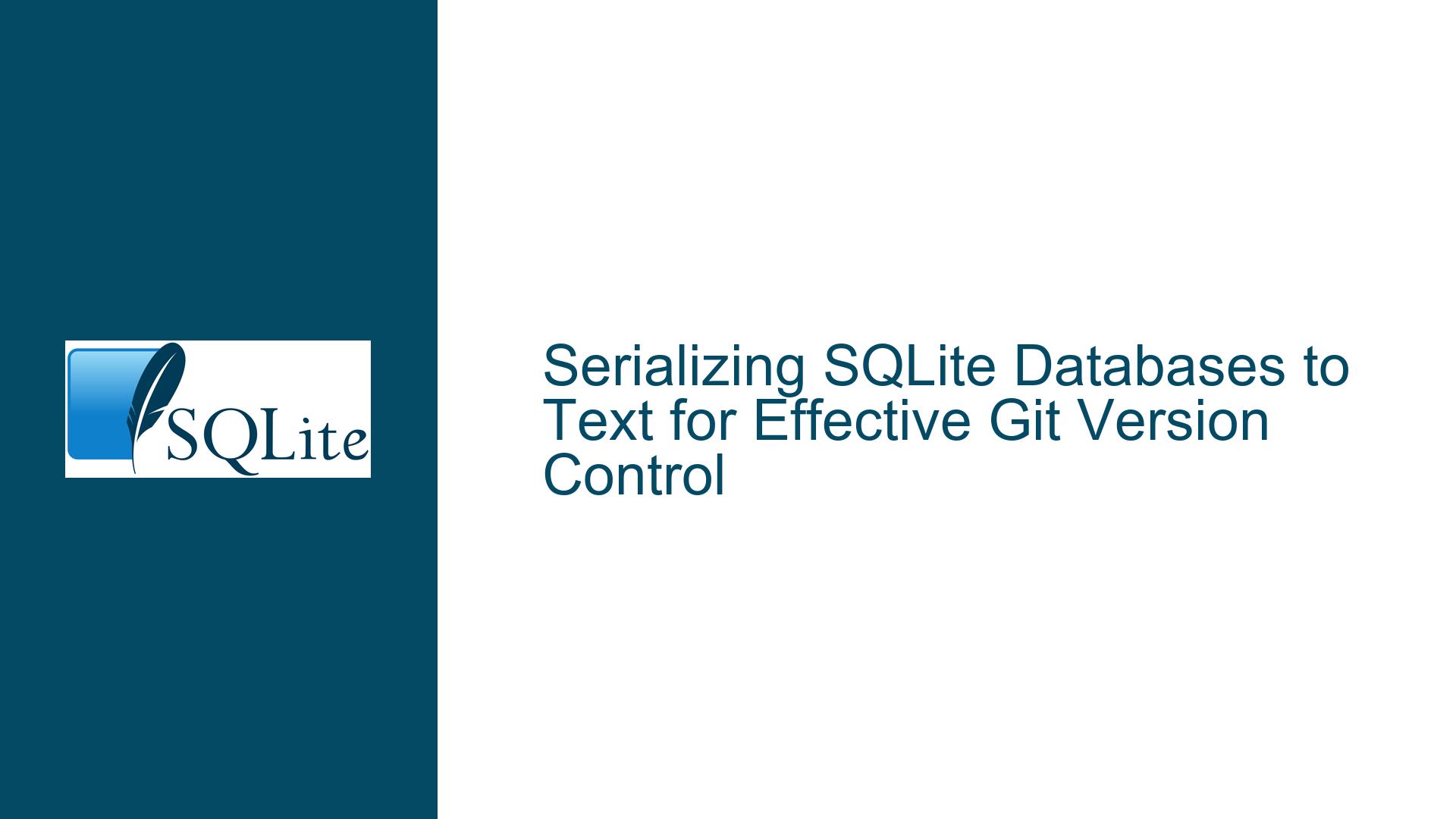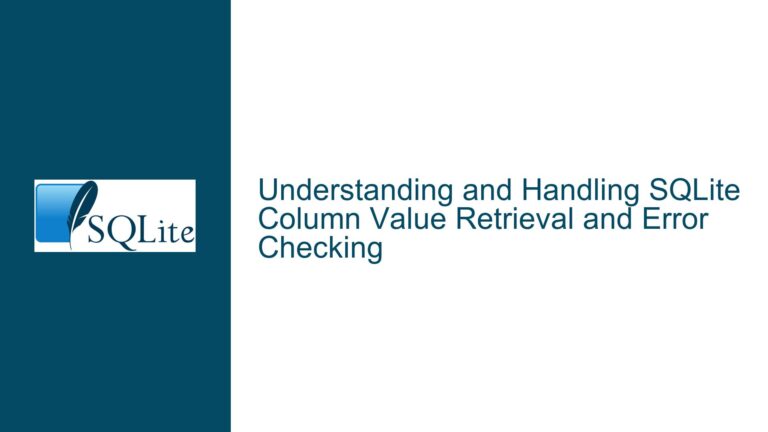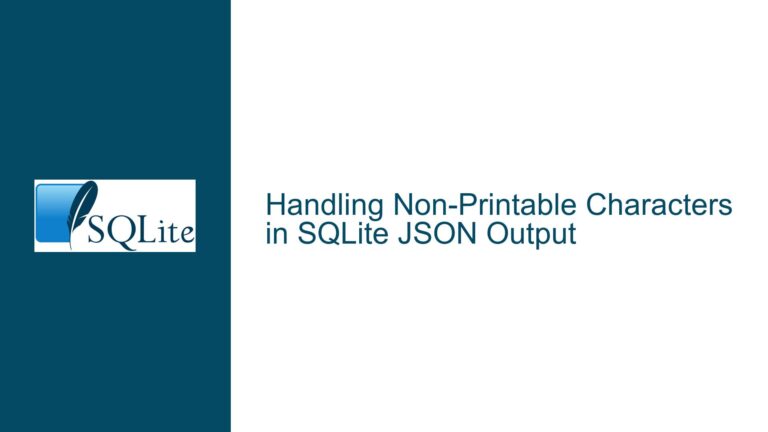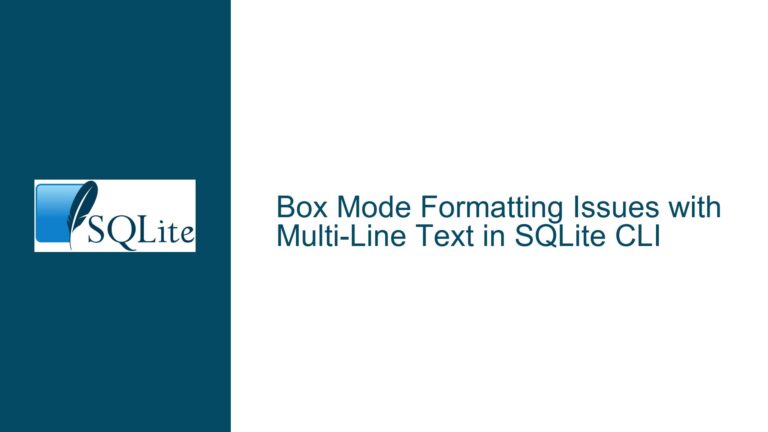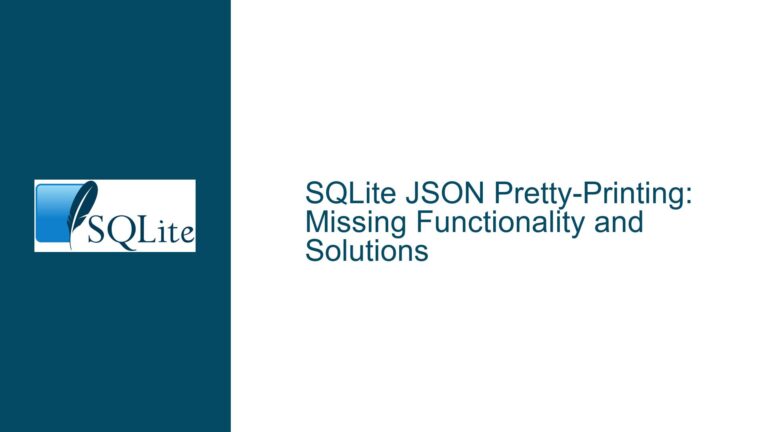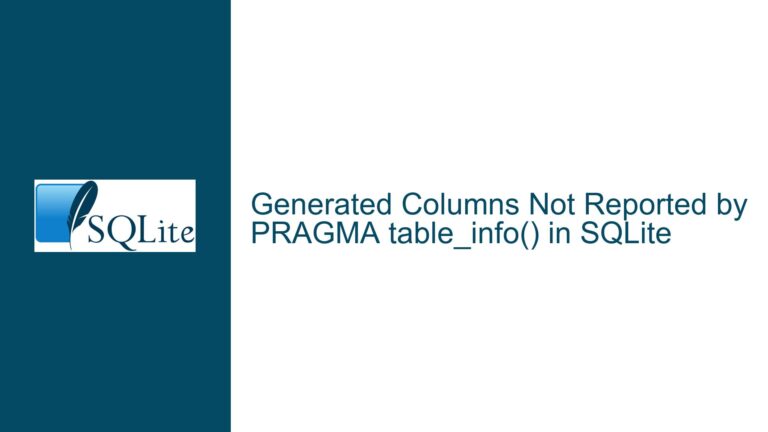Serializing SQLite Databases to Text for Effective Git Version Control
Understanding the Challenge of Consistent SQLite Database Serialization for Git Diffing
Issue Overview: Binary SQLite Databases Cause Ineffective Git Diffs
SQLite databases are stored as binary files by default, which poses a significant challenge when attempting to track changes in version control systems like Git. The fundamental problem arises from how Git handles binary versus text files:
Binary File Limitations:
Git’s diff algorithm operates optimally on text files, where line-by-line comparisons reveal meaningful changes. Binary files (like.dbfiles) appear as monolithic blobs to Git, triggering false-positive "changes" even when logical content remains identical between commits. This occurs because:- SQLite’s internal storage mechanisms (page allocation strategies, free list management)
- File header metadata (schema version, write counter)
- Journaling modes (WAL, DELETE)
- Vacuum operations
- Database page fragmentation
All contribute to byte-level differences invisible to end users but detectable by Git.
Serialization Requirements:
Converting the database to a text-based operational log requires capturing both schema evolution and data modifications in a deterministic format. Key requirements include:- Complete schema representation (tables, indexes, triggers, views)
- Insertion order consistency for reproducible database rebuilds
- Data normalization for predictable text output
- Transaction boundary preservation to maintain ACID guarantees
Rebuild Fidelity:
Reconstructing a binary database from serialized text must produce byte-for-byte identical output when logical content hasn’t changed. Common failure points include:- SQLite version differences in storage engines
- Platform-specific encoding behaviors
- Random seed values in
sqlite_sequencefor autoincrement tables - Uncontrolled pragma settings (e.g.,
journal_mode,page_size)
Core Obstacles in Generating Deterministic SQLite Schema/Data Exports
Cause 1: Non-Deterministic .dump Output Ordering
The SQLite CLI’s .dump command produces SQL statements that reconstruct the database, but with critical limitations:
PRAGMA foreign_keys=OFF;
BEGIN TRANSACTION;
CREATE TABLE t1(a INTEGER PRIMARY KEY, b TEXT);
INSERT INTO t1 VALUES(1,'alpha'),(3,'gamma');
CREATE INDEX idx1 ON t1(b);
COMMIT;
Table/Index Creation Order:
SQLite outputs objects in arbitrary order based on internalsqlite_schemastorage, which varies between database files even with identical schemas.Row Insertion Sequence:
INSERT statements follow physical storage order rather than primary key order, causing diffs from harmless row rearrangements.Schema Metadata Variations:
sqlite_autoindexinternal indexes andsqlite_sequencetables introduce non-deterministic elements.
Cause 2: Pragmas and Database Configuration Drift
Database-level settings persist in the binary file and influence rebuild behavior:
PRAGMA journal_mode=WAL;
PRAGMA page_size=4096;
PRAGMA auto_vacuum=FULL;
Journaling Modes:
WAL vs. DELETE modes create different file layouts (.db-wal,.db-shm).Page Size Configuration:
Directly impacts how SQLite allocates storage space.Encoding Settings:
PRAGMA encodingaffects string storage and comparison rules.
Cause 3: SQLite Version-Specific Storage Formats
Different SQLite versions (3.32.0 vs 3.38.0) may:
- Use updated B-tree page formats
- Change index construction algorithms
- Modify VACUUM operation behaviors
- Alter header metadata storage
Resulting in binary differences even with identical logical content.
Comprehensive Strategy for Deterministic SQLite Serialization and Git Integration
Step 1: Generate Canonical Schema Representation
Objective: Produce a deterministic schema dump immune to SQLite’s internal storage order.
Implementation:
Schema Extraction with Order Enforcement:
sqlite3 input.db "SELECT sql || ';' FROM sqlite_schema WHERE type='table' AND name NOT LIKE 'sqlite_%' ORDER BY name; SELECT sql || ';' FROM sqlite_schema WHERE type='index' AND name NOT LIKE 'sqlite_%' ORDER BY name;"- Table Sorting: Alphabetically order tables by name
- Index Sorting: Alphabetize indexes separately
- Exclusion of SQLite Internals: Skip
sqlite_sequence,sqlite_stat1, etc.
Schema Normalization:
- Remove redundant
PRAGMAstatements - Standardize whitespace and formatting
- Enforce
IF NOT EXISTSclauses - Use explicit column collations
- Remove redundant
DDL Validation:
sqlite3 test.db < schema.sql sqlite3 test.db ".schema --indent" > actual_schema.sql diff canonical_schema.sql actual_schema.sql
Step 2: Export Data in Deterministic Insert Order
Objective: Generate INSERT statements ordered by primary keys to prevent row order variance.
Implementation:
Primary Key Ordered Exports:
for TABLE in $(sqlite3 db.db "SELECT name FROM sqlite_schema WHERE type='table' AND name NOT LIKE 'sqlite_%' ORDER BY name;"); do echo "DELETE FROM $TABLE;" echo -e ".mode insert $TABLE\nSELECT * FROM $TABLE ORDER BY rowid;" | sqlite3 db.db doneBatch Insert Optimization:
Convert individual inserts into bulk operations:
INSERT INTO t1(a,b) VALUES (1,'alpha'),(3,'gamma'),(5,'epsilon');Binary Data Handling:
Encode BLOBs using SQLite’s hex literal format:
X'53514C69746520626C6F622064617461'Temporal Data Normalization:
Standardize datetime formats using
strftime:SELECT strftime('%Y-%m-%dT%H:%M:%f', datetime_column) FROM table ORDER BY datetime_column;
Step 3: Enforce Rebuild Configuration Consistency
Objective: Guarantee identical binary output across rebuilds through controlled pragmas.
Implementation:
Pragma Initialization Header:
Prepend rebuild scripts with configuration commands:
PRAGMA journal_mode=OFF; PRAGMA page_size=4096; PRAGMA auto_vacuum=NONE; PRAGMA encoding='UTF-8'; PRAGMA foreign_keys=ON;Version Locking:
Use fixed SQLite versions for serialization/deserialization:
FROM alpine:3.16 RUN apk add sqlite=3.38.5-r0Post-Rebuild Sanitization:
Reset volatile database metadata:
DELETE FROM sqlite_sequence; VACUUM;
Step 4: Integrate with Git Hooks for Automated Serialization
Objective: Automate text serialization during Git operations.
Implementation:
Pre-Commit Hook:
.git/hooks/pre-commit:#!/bin/bash DB_FILE=app.db TEXT_FILE=db/schema.sql # Serialize current DB sqlite3 $DB_FILE ".dump" | canonicalize_dump > $TEXT_FILE git add $TEXT_FILE # Verify rebuild capability sqlite3 rebuilt.db < $TEXT_FILE if ! diff <(sqlite3 $DB_FILE .dump | canonicalize_dump) \ <(sqlite3 rebuilt.db .dump | canonicalize_dump); then echo "Rebuild verification failed!" exit 1 fiPost-Checkout Hook:
.git/hooks/post-checkout:#!/bin/bash sqlite3 app.db < db/schema.sqlDiff Driver Registration:
.git/config:[diff "sqldump"] textconv = "sqlite3 $1 .dump | canonicalize_dump" binary = true.gitattributes:*.db diff=sqldump
Step 5: Advanced Differential Compression Techniques
Objective: Minimize diff size through semantic-aware compression.
Implementation:
Schema-Weighted Sorting:
Prioritize tables by volatility in diff outputs:
sqlite3 db.db "SELECT name FROM sqlite_schema WHERE type='table' ORDER BY (name IN ('high_churn_table', 'another_volatile_table'));"Change Data Capture (CDC):
Maintain a trigger-based changelog:
CREATE TABLE _cdc_log ( id INTEGER PRIMARY KEY, table_name TEXT, row_id INTEGER, operation TEXT, timestamp DATETIME DEFAULT CURRENT_TIMESTAMP ); CREATE TRIGGER track_t1_insert AFTER INSERT ON t1 BEGIN INSERT INTO _cdc_log(table_name, row_id, operation) VALUES ('t1', NEW.rowid, 'INSERT'); END;Semantic Diff Generation:
Use SQL to generate human-readable diffs:
SELECT 'Added row in t1: id=' || rowid || ', data=' || data FROM t1 WHERE rowid NOT IN (SELECT rowid FROM t1_old); SELECT 'Modified row in t1: id=' || t1.rowid || ', old_data=' || t1_old.data || ', new_data=' || t1.data FROM t1 JOIN t1_old ON t1.rowid = t1_old.rowid WHERE t1.data != t1_old.data;
Step 6: Validation and Testing Framework
Objective: Ensure serialization/deserialization round-trip fidelity.
Implementation:
Binary Equality Test:
original_hash=$(sha256sum original.db) sqlite3 original.db ".dump" | sqlite3 reconstructed.db reconstructed_hash=$(sha256sum reconstructed.db) if [ "$original_hash" != "$reconstructed_hash" ]; then diff <(xxd original.db) <(xxd reconstructed.db) | head -n 100 exit 1 fiCross-Platform Validation:
Test matrix covering:
- SQLite versions (3.35.0+, LTS releases)
- Operating Systems (Linux, macOS, Windows WSL2)
- Architectures (x86_64, ARM64)
- Filesystems (APFS, ext4, NTFS)
Performance Benchmarking:
Measure serialization/deserialization times:
hyperfine \ --warmup 3 \ "sqlite3 large.db '.dump' > dump.sql" \ "sqlite3 large.db '.dump' | gzip -9 > dump.sql.gz" \ "sqldump --canonical large.db > canonical.sql"
Step 7: Migration to Fossil SCM Considerations
Objective: Evaluate Fossil’s advantages for SQLite versioning.
Comparison Matrix:
| Feature | Git + SQLite Dump | Fossil SCM |
|---|---|---|
| Binary Diff Efficiency | Requires custom text serialization | Built-in SQLite delta compression |
| Historical Query Support | Manual git log parsing | fossil sql time-travel queries |
| Schema Evolution Tracking | Text diffs of .sql files | Integrated artifact storage |
| Merge Conflict Handling | Line-based SQL merging | Semantic schema merging |
| Auto-Sync Functionality | Manual push/pull | Built-in sync protocol |
Migration Pathway:
Fossil Repository Initialization:
fossil new project.fossil fossil open project.fossil fossil set mtime-changes off # Critical for SQLite timestamp handlingSQLite-Aware Checkin:
fossil add --delta db/*.dbHistorical Analysis:
fossil sql --vers 2022-01-01 "SELECT * FROM historical_data"
Final Implementation Checklist
Serialization Process:
- [ ] Use
.dumpwithORDER BYclauses for schema objects - [ ] Normalize all date/time fields to ISO8601
- [ ] Encode BLOBs in hexadecimal format
- [ ] Set fixed pragma values in dump header
- [ ] Use
Git Integration:
- [ ] Install pre-commit hook for auto-serialization
- [ ] Configure
.gitattributesdiff driver - [ ] Exclude binary
.dbfiles via.gitignore - [ ] Test cross-platform rebuild consistency
Validation Suite:
- [ ] SHA256 checksum verification
- [ ] Round-trip schema validation
- [ ] Performance regression tests
- [ ] Edge case testing (empty DB, large BLOBs, unicode)
Monitoring & Maintenance:
- Alert on SQLite version updates
- Periodic rebuild consistency checks
- Diff size optimization reviews
- CDC log performance impact analysis
By systematically addressing each layer of non-determinism in SQLite serialization—from schema dumping order and data export sequencing to pragma configuration management—developers can achieve true binary stability across Git commits. This enables effective version control of SQLite databases while maintaining the ability to reconstruct byte-identical database files from text-based dumps. The techniques outlined establish a robust foundation for integrating SQLite into Git workflows, with optional pathways for adopting Fossil SCM’s native SQLite versioning capabilities.
